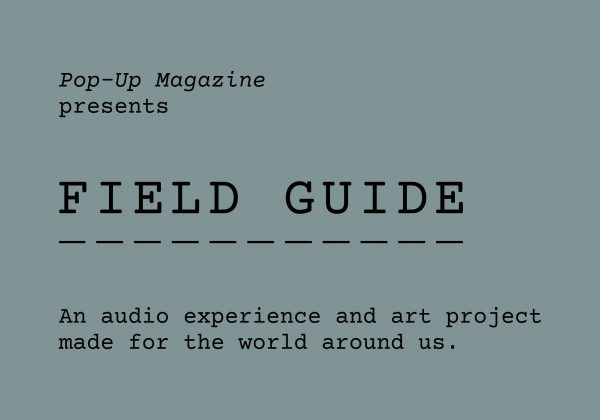What does water mean to you? In this feature, author Bonnie Tsui (Why We Swim), actress Joy Bryant, submarine pilot Erika Bergman, figure skater Elladj Baldé, 85-year-old synchronized swimmer Barbara Eison-White, professional mermaid Olivia Gonzales, and others share stories about the many ways water influences our lives.

From Pop-Up Magazine, creators of this Field Guide series: “We recommend listening outside, near water if you can. Head to the ocean if you’re on the coast. Or walk to a nearby pond or creek. Sit by a fountain at a park. Or just pour yourself a glass of water.” Other episodes in this set cover trees and night skies, too. And if you’ve never been to a Pop-Up event, we at 99pi would strongly encourage you to check out the next one that passes through your city, too!

“In a year when so much was strange and hard, one thing felt almost normal. Going outside. For some of us, accustomed to the woods or the mountains or the beach on a Saturday morning, nature has been a rare constant from the time before masks and distancing and everything else. For others of us, it was something new. A revelation, even. Walking everywhere. Making plans at a park the way we used to pick a restaurant or club. Living in the environment in a new way.” Click here for more stories from this Field Guide series, or check out this print companion to the audio and visual pieces on their website.
After the break, stay tuned for an excerpt of Roman Mars On The Anatomy Of A Good Story (w/ Michelle Fournet, Roman Mars, Pedro Pascal), part of the Periodic Talks podcast. It’s a show about what gets people curious, from virtual experiences to celestial bodies, with Gillian Jacobs (Community, Netflix’s LOVE) and Diona Reasonover (NCIS).



Comments (2)
Share
I found it astonishing that Dr. Rhian Waller, an associate professor of marine sciences, thinks anemones (as correctly spelled in your transcript) are “anenomes”.
When I first moved to NYC I couldn’t understand how people were willing to live in new luxury condos located on the Gowanus Canal. But listening to the piece with the reckless kayaker made it clear to me that most people don’t actually know what pollutants are and how they’re bad for you. I have no idea how her first reaction was mortification rather than having the urgency to get out as fast as possible. The heavy metals found in the Gowanus at that time, before and during the dredging, are incredibly toxic and very quickly absorbed. Fhe hapless kayaker should definitely see her doctor to get tests for lead, arsenic, and mercury, especially if she would like to have children.